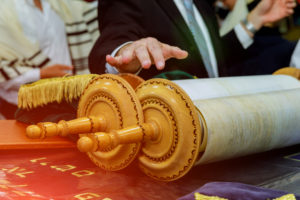
By Rabbi Gila Colman Ruski
Parshat Ki Tetzei
Lately, as I walk around West Philly, I have been noticing more and more tzitzit dangling from corners of garments. As Philadelphian Jews no doubt know, this is not a neighborhood where Orthodox Jews generally live. These tzitzit seem to be attached to more casual clothing than one might expect an Orthodox man to wear. (I know that these are assumptions and stereotypes, but bear with me).
I’ve been trying to figure out what is compelling Jews outside the Orthodox community to don these fringes. Is it a fad? A cultural identification? Or is there a deep spiritual meaning of wearing tzitzit that holds a message for contemporary Jews?
The commandment “You shall make yourself twisted fringes upon the four corners of your garment” (22:12) appears for the second time in the Torah in this week’s portion, Ki Tetzei. It’s found in the book of Deuteronomy, nestled in a long list of 74 seemingly disconnected commandments.
Lists of commandments seem legalistic and severed from intimacy with God and each other. How can we achieve the difficult qualities of peace and righteousness and mutual aid that we all treasure by following a checklist?
Our sages humanized the life experience of living these mitzvot by crafting colorful, engaging Midrashim. From the Babylonian Talmud, tzitzit dramatically remind the wearer daily to resist the impulse to ignore God’s covenant.
There was once a man who was very scrupulous about the precept of tzitzit. One day he heard of a certain harlot overseas who took four hundred gold dinars for her hire. He sent her four hundred gold dinars and scheduled a day with her. When the day arrived he came and waited at her door, and her maid went and told her, “That man who sent you four hundred gold dinars is here and waiting at the door”; to which she replied, “Let him come in.”
When he came in she prepared for him seven beds, six of silver and one of gold. She then went up to the top bed and lay down upon it naked. He too went up after her in his desire to sit naked with her, when all of a sudden the four fringes of his garment struck him across the face; whereupon he slipped off and sat upon the ground. She also sat upon the ground and said, “I swear by the Roman Caesar, I will not let you go until you tell me what blemish you saw in me!”
“I swear,” the Jew replied, “that I have never seen a woman as beautiful as you. However, this mitzvah of tzitzit will never let me forget that I follow the covenant with God, and must not be led astray.
“I still will not leave you,” the prostitute said, “until you provide me with your name, the names of your city, rabbi, and the school in which you study Torah.”
He wrote down all the information and handed it to her.
The woman sold all her possessions. A third of the money she gave to the government (as a payoff so that they would allow her to convert to Judaism), a third she handed out to the poor, and the remaining third she took with her — along with the silver and gold beds — and she proceeded to the school which the man had named, the study hall of Rabbi Chiya.
“Rabbi,” she said to Rabbi Chiya, “I would like to convert to Judaism.”
“Perhaps,” Rabbi Chiya responded, “you desire to convert because you have taken a liking to a Jewish man?”
The woman pulled out the piece of paper with the information and related to the rabbi the miracle which transpired with the tzitzit.
“You may go and claim that which is rightfully yours [i.e. the right to convert],” the rabbi proclaimed.
She ended up marrying the man. Those very beds which she originally prepared for him illicitly, she now prepared for him lawfully. Such was his reward for meticulously observing the mitzvah of tzitzit (Menachot 44a).
What can this teach us? No, I have not seen any local tzitzit wearers slapped in the face by magical fringes, but the impulse to stray from the compassionate, just and sacred is as powerful as ever.
If the outward sign of a physical ritual reminds us to resist road wrath, pandemic rage, greed, abusive behavior toward the environment and each other and ourselves, and neglect of those in need, I say: “Bring it.”
Tzitzit were never intended to be about fashion. As they did for the harlot, perhaps they may transform us with abiding awareness of the divine.
Rabbi Gila Colman Ruskin cares for her 98-year-old mother and her grandchildren. She creates midrash from mosaics. The Board of Rabbis of Greater Philadelphia is proud to provide diverse perspectives on Torah commentary for the Jewish Exponent. The opinions expressed in this column are the author’s own and do not reflect the view of the Board of Rabbis.





